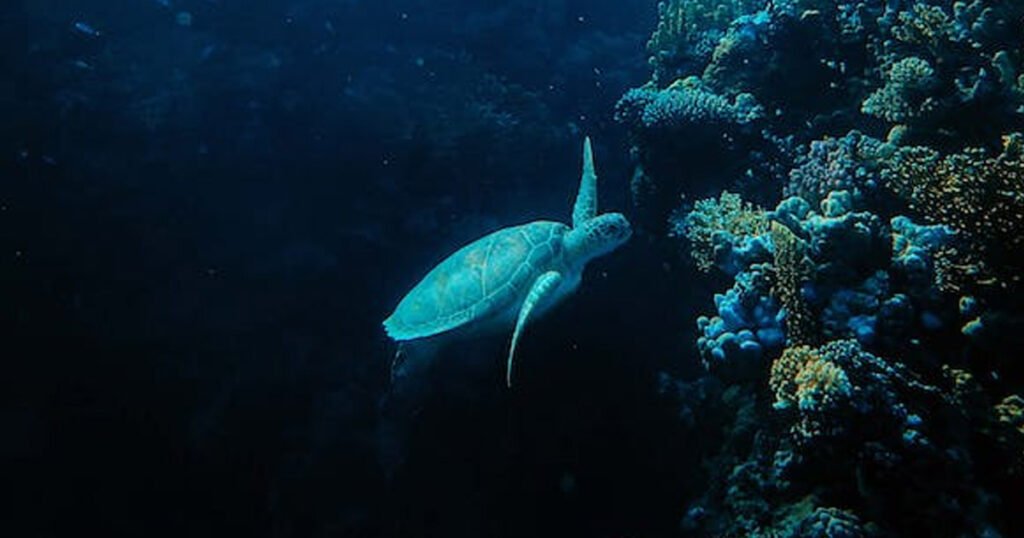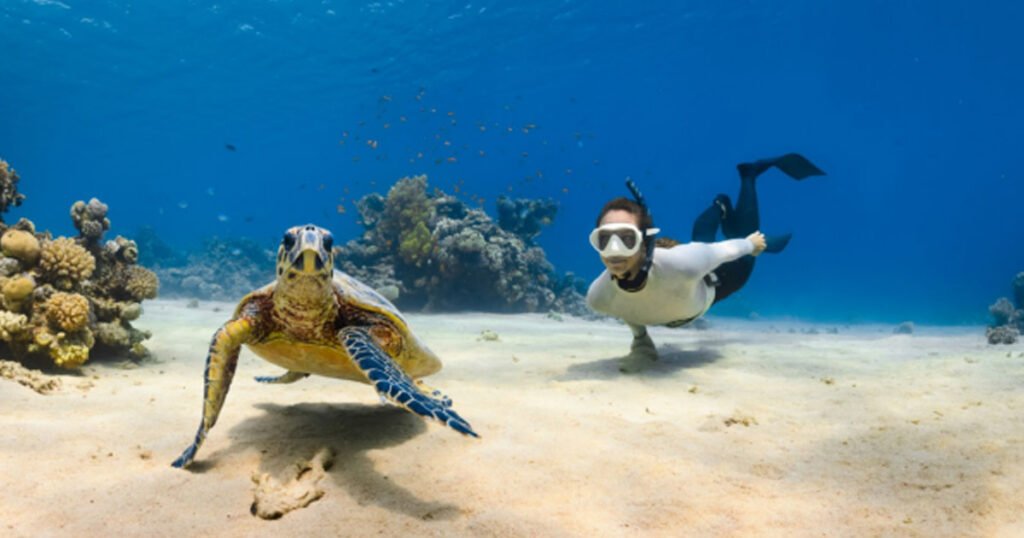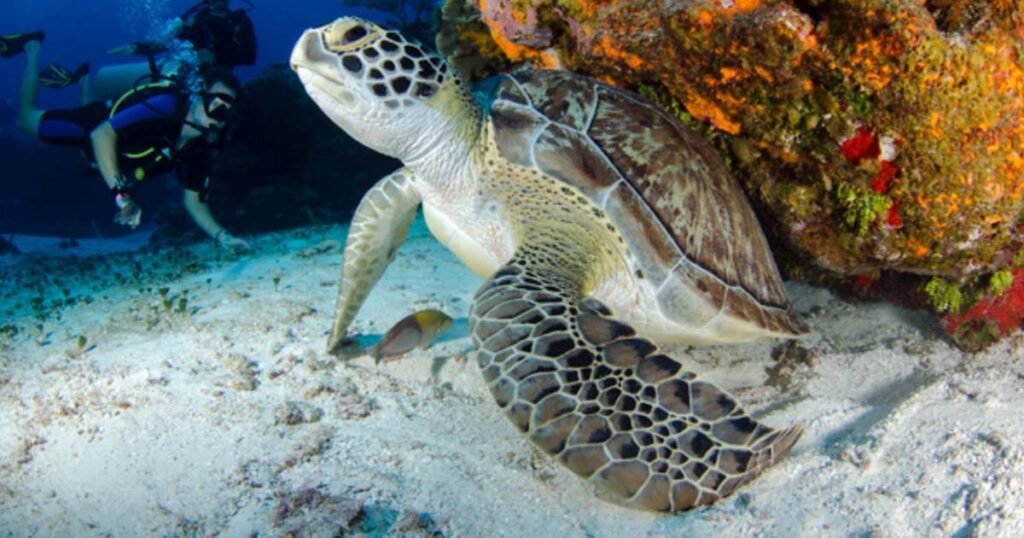Sea turtles are among the most magnificent creatures on the planet, yet their numbers are diminishing, making knowing about them more important than ever. This article covers a common topic among those who see sea turtles in the wild: can sea turtles bite?
In a nutshell, sea turtles don’t bite. These animals are generally gentle and have no desire to prey on or bite humans.
Table of Contents
Are Sea Turtles Teeth in Their Mouths?

Sea turtles have teeth, but they also have mouths. However, their interior mouth and esophageal tract are designed to aid with digestion. Here’s how we can highlight their mouth.
- Mouth adaptation to an omnivorous diet.
- Sharp-edged jaws rip the meal apart.
- The shape of the jaws and the strength of the muscles are used to break apart plants and algae.
- The mouth is coated with a hard, bony palate to crush and grind food.
There are different classifications of animals based on their body strength and demands. The loggerhead turtle preys on mollusks and crabs. Their jaws are stronger than others
Can Sea Turtles Bite Humans?

Imagine you’re swimming in the ocean, enjoying the waves! Suddenly, you notice a massive, slow-moving creature with an unusual shell. It is a marine turtle! Sea turtles can bite, but they prefer not to! They are calm animals that primarily eat plants and jellyfish.
While sea turtles can bite, they normally do not bite humans unless they are terrified or threatened. So, if you’re swimming or snorkeling and spot a sea turtle, give them lots of space and understand them from a safe distance. This way, you may enjoy observing these magnificent creatures without worrying about being accidentally nibbled.
Can a Sea Turtle Bite Your Finger Off?
Sea turtles cannot often bite off a human finger. While sea turtles have strong jaws and sharp beaks, they are rarely violent toward humans and are not known to bite off fingers. It’s quite unlikely that they’d bite off your finger! Here’s why.
- They are not aggressive: Sea turtles are friendly creatures who prefer to eat seaweed and jellyfish rather than fingers. They primarily use their beaks to grab food, not to snap at people.
- Their bite isn’t super strong: Sea turtles have a weaker bite than other biting creatures, such as snapping turtles. They’re incapable of chewing through bones or anything thick.
- They’re more terrified of you: If you come across a sea turtle in the wild, they will most likely be afraid and swim away rather than attack. Remember, they regard us as large, unusual creatures!
So, while it’s important to be respectful and give sea turtles plenty of space, you shouldn’t be concerned about losing a finger on your next beach excursion. However, keep in mind that they are wild creatures, so keep a safe distance and never approach or harass them.
Are Sea Turtles Aggressive?

Sea turtles are often not aggressive toward humans. They are noted for their mild demeanor and natural curiosity about their environment. While sea turtles may exhibit protective actions when attacked or afraid, such as snapping their jaws or quickly swimming away, they are not hostile by nature.
It is important to remember that sea turtles are wild animals that must be treated with care. To avoid disturbing or harming the turtles, give them lots of space and observe them from a safe distance. By preserving their space and habitat, we may continue to appreciate these amazing creatures in their natural environment.
Is Touching a Sea Turtle Allowed?

It is generally not acceptable to touch a sea turtle in the wild. Although they appear cute and friendly, stroking them can stress them out and interrupt their natural behavior. Sea turtles are wild animals, so please respect their space and habitat.
If you chance to see a sea turtle while swimming or snorkeling, remain a safe distance and appreciate it from afar. Touching them can also be detrimental to you because sea turtles can carry bacteria that may cause illness. So, for your own and the sea turtle’s sake, avoid touching them and instead enjoy seeing them in their natural habitat.
How Much Strength Does a Turtle Bite Have?
The strength of turtle bites varies according to the turtle’s species and size. Larger turtles with stronger jaws, such as snapping turtles and larger tortoises, can typically deliver more powerful bites. Snapping turtles, for example, have extremely strong jaws that may deliver a severe bite force, resulting in catastrophic harm. Smaller turtles, such as pet turtles or certain types of aquatic turtles, may have less powerful bites.
To avoid unintentional bites, turtles must be handled with care and respect, and your fingers or hands should not be near their mouth. Turtle bites may not be as forceful as those of other animals, but they can still cause injury, especially if the turtle is threatened or scared. To avoid mishaps, always approach turtles with caution and treat them carefully.
Are Sea Turtle Bites Infectious?
Sea turtle bites can be infectious, especially if the turtle has bacteria or pathogens in its mouth. Sea turtles, like many other animals, can carry bacteria that can cause diseases if they get into a wound. Furthermore, sea turtles may carry germs from their surroundings, which could cause illness if transmitted by a bite.
If a person gets bitten by a sea turtle, the wound should be carefully cleaned with soap and water as quickly as possible to avoid the danger of infection. Using an antiseptic or disinfectant on the wound can also help avoid infection. If the bite breaks the skin or causes substantial injury, get medical attention right away to evaluate the wound and determine whether additional treatment, such as antibiotics, is required.
Overall, while sea turtle bites are uncommon and sea turtles are not typically aggressive toward humans, any bite wounds should be treated seriously and with necessary precautions to avoid infection.
Is The Bite of a Baby Turtle Painful?
A bite from a baby turtle is unlikely to cause as much pain as a bite from a larger turtle or other creatures with stronger jaws. Baby turtles have smaller mouths and less developed jaw muscles, therefore their bites are often weaker than those of adult turtles.
However, even if a baby turtle’s bite does not inflict substantial discomfort, it is critical to treat them with care and respect. Any bite, regardless of the animal’s size, can break the skin and cause infection if proper wound care is not provided. To minimize unintentional bites, avoid placing your fingers or hands near a baby turtle’s mouth, and handle them gently to protect its well-being and safety.
Read More: Do Turtles Recognize Their Owners
Final Thought
can sea turtles bite? Sea turtles do not bite or attack people unnecessarily. They must be treated with respect and watched from a safe distance. They, like other marine species, contribute to the cleanup of the sea environment.
Try not to irritate or touch them. You would undoubtedly cause injury to your skin. The turtles may not cause you any harm, but they will bite you as a form of defense.
